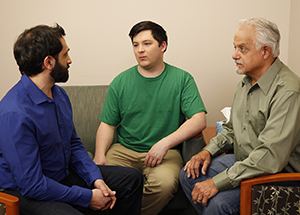It's not easy to admit that you have a problem with alcohol or drugs. You may hear this called addiction or a substance use disorder. Facing it takes courage and honesty. But once you are ready to look at your use, you have taken a big step toward tackling the problem.
You are responsible for your actions and for making healthy choices. But there are many programs and people who can help you. It’s OK to get help. It’s the first step to getting your life back together.
Getting help and support
Recovery doesn’t happen right away. There are many steps along the way. You’ll learn new, healthy ways to solve problems. You'll learn how to communicate, and resolve conflicts.
A counselor or other health care provider can help you. So can a faith leader trained in substance abuse counseling. Friends and family may help once you are working with experts. Together you can make changes needed for success. This can help you have a positive and rewarding life.
To find help near you
To find treatment, contact:
Substance Abuse and Mental Health Services Administration (SAMHSA)
800-662-4357 (800-662-HELP)


